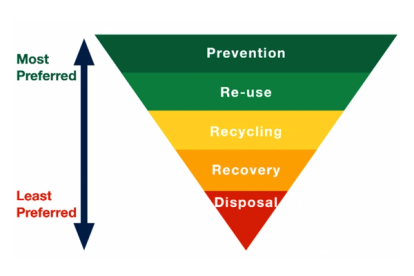
The waste hierarchy: moving towards prevention and re-use
- Post Date
- 14 April 2023
- Read Time
- 3 minutes

The waste hierarchy guides the aspirations and targets for managing waste, whilst retaining the highest possible material value at all times. Today, society operates a well-established linear economic model, where we take, make then dispose of products. However, in a linear model, we rarely see waste prevention, or the re-use of resources / waste adopted in the first instance, with a focus primarily on downgrading materials further within the waste hierarchy towards recycling outcomes.

Figure 1: waste hierarchy
Local Authorities achieve on average a 40-50% recycling rate of waste generated by households[1], which leaves c.50% of remaining waste which is further downgraded, predominantly to energy recovery and landfill. A key point of note is that recycling rates vary considerably across local authorities in the UK, with a large number of factors contributing to this, for example: high rise buildings leading to waste management challenges, limited levels of resident awareness, transient populations, non-uniformity of recycling services across councils. A good example is separate food & garden waste collections; where some councils have both, others may have neither. There is an increasing push for recycling solutions and resource efficiency initiatives within legislation, with upcoming and to be finalised new requirements including extended producer responsibility, deposit return scheme, mandatory separate food waste collections as well as consistent collections. Across the board, these legislative requirements aim to move materials further up the waste hierarchy, however do not reach, or focus, on the most preferred options of prevention and re-use as defined by the waste hierarchy. There has been a significant uplift in activities focused on prevention and re-use, however these have largely been driven by NGO and community initiatives rather than via legislative obligations. Examples include repair shops and share schemes such as the Share Shed[2] in Devon which provides a borrowing service for many useful items. Such activities have been proven to reduce resource burdens and aid with social inequalities within certain activities, another example being the Waste Not Want Not Scheme in Wiltshire[3] supporting low household incomes with upcycled second-hand/donated household goods.
At present, legislative requirements are such that the focus on prevention and re-use are not seen consistently at the national level, due to the challenges mentioned earlier in this article. This translates into fragmented and inconsistent local initiatives being relied upon to drive changing attitudes and behaviours to prevention and reuse. Thus, we see the need for a consistent approach defined at the national level which provides a focus on the top end of the waste hierarchy to truly reduce wastes and shift the nation from linear operations towards a circular model.
Aside from legislative requirements, increasing consumer awareness of environmental issues has increased consumer demand to be associated with sustainable and environmentally conscious brands. Consequently, we have seen a growing demand for our expertise to support clients in reducing their waste production with a focus on waste prevention and waste re-use. If this is an area your business is pursuing, please get in touch to learn more about how SLR can support you in this area.
[1] https://assets.publishing.service.gov.uk/government/uploads/system/uploads/attachment_data/file/1040756/Statistics_on_waste_managed_by_local_authorities_in_England_in_2020_v2rev_accessible.pdf
[2] https://www.shareshed.org.uk/
[3] https://waste-not-want-not.org.uk/
Recent posts
-

-

Unlocking value through solar PV repowering: A focus on module replacement and DC/AC optimisation
by David Fernandez
View post -
